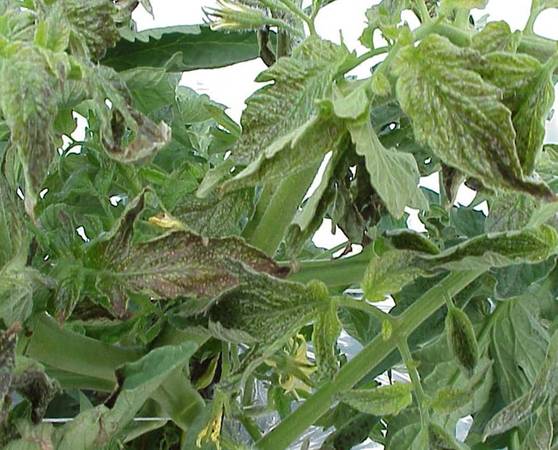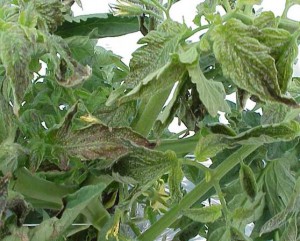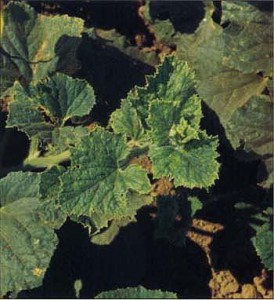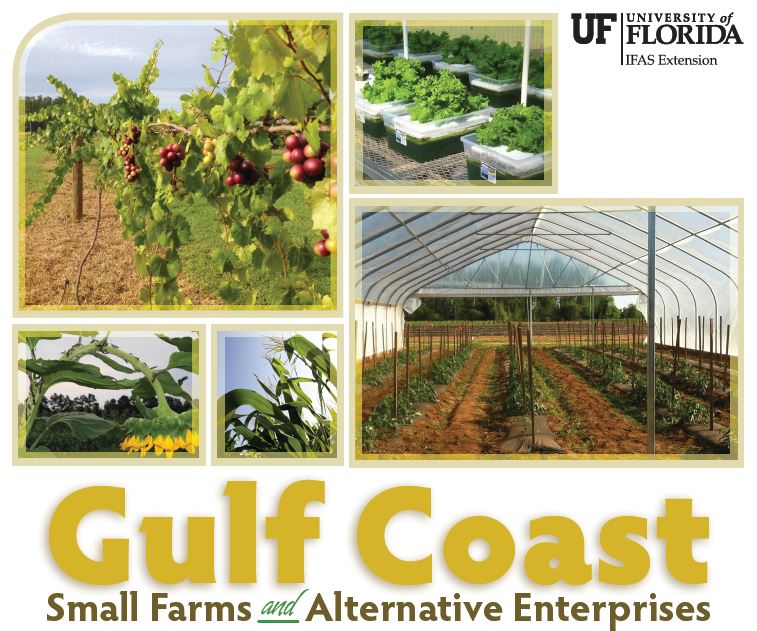
by Eddie Powell | Jun 3, 2014
During this growing season monitor your plants and keep them healthy as a healthy plant will be able to better survive an invader attack.
Nematode populations can be reduced temporarily by soil solarization. It is a technique that uses the sun’s heat to kill the soil-borne pests. Adding organic matter to the soil will help reduce nematode populations as well. Nematodes are microscopic worms that attack vegetable roots and reduce growth and yield. The organic matter will also improve water holding capacity and increase nutrient content.

Tomato Spotted Wilt Virus
Credits: UF/IFAS
If you choose to use pesticides, please follow pesticide label directions carefully. Learn to properly identify garden pests and use chemicals only when a serious pest problem exists. If you have questions please call your UF/IFAS county extension office. We can provide helpful information about insect identification.
Organic gardeners can use certain products like BT(Dipel) to control pests. Please remember not every off-the-shelf pesticide can be used on every crop. So be sure the vegetable you want to treat is on the label before purchasing the product.
Follow label directions for measuring, mixing and pay attention to any pre-harvest interval warning. That is the time that must elapse between application of the pesticide and harvest. For example, broccoli sprayed with carbaryl (Sevin) should not be harvested for two weeks.
Spray the plant thoroughly, covering both the upper and lower leaf surfaces. Do not apply pesticides on windy days. Follow all safety precautions on the label, keep others and pets out of the area until sprays have dried. Apply insecticides late in the afternoon or in the early evening when bees and other pollinators are less active. Products like malathion, carbaryl and pyrethroids are especially harmful to bees.
To reduce spray burn, make sure the plants are not under moisture stress. Water if necessary and let leaves dry before spraying. Avoid using soaps and oils when the weather is very hot, because this can cause leaf burn.
Control slugs with products containing iron phosphate.

Cucumber Mosaic Virus
Credits: UF/IFAS
Many common diseases can be controlled with sprays like chlorothalonil, maneb, or mancozeb fungicide. Powdery mildews can be controlled with triadimefon, myclobutanil, sulfur, or horticultural oils. Rust can be controlled with sulfur, propiconazole, ortebuconazole. Sprays are generally more effective than dusts.
by Blake Thaxton | Apr 12, 2013

UF/IFAS NW District Extension agents and the UF/IFAS West Florida Research and Education Center have joined forces to provide relevant hands on training for the Small Farmers of northwest Florida and surrounding areas by developing the Gulf Coast Small Farms and Alternative Enterprises program. This Spring Field Day will be a sneak peek at what the program will offer in the coming months and years.
Join us to discover new production practices and opportunities for your small farm or fruit and vegetable gardens!
Topics and Demonstrations:
- Irrigation Practices
- Small Farm Integrated Pest Management
- Hydroponic Float Bed Lettuce
- Protected Agriculture
- Food Safety Issues for the Small Farm

Register here: Gulf Coast Small Farms & Alternative Enterprises
For more information please contact:
Robin Vickers at 850-393-7334 or rvickers@ufl.edu
Blake Thaxton at 850-623-3868 or bthaxton@ufl.edu
by | May 10, 2012

Eddie Powell
Extension Horticultural Courtesy Agent I
Walton County
pep5@ufl.edu
With spring in full swing many Florida homeowners are gearing up to grow their own vegetables. The most frequently asked question this time of year is, “why do I need to fertilize my soil?” The answer is simple – – not all nutrients are present in the right amounts to support good plant health. North Florida is a prime example of an area lacking certain nutrients, since the soils in this area are generally infertile and acidic. Therefore, ample amounts of lime and fertilizer must be applied to the soil for adequate plant growth. If this is not done then the crops will suffer from inadequate plant growth and food supply.
Most vegetable crops grow and perform best at a pH range, 6.0-7.0. A soil sample must be taken to determine soil pH. Feel free to bring one of those samples by your local University of Florida Extension office for your soils pH results. Now if the pH extends far below or above this range, then crop productivity will be significantly reduced. This happens because the crop cannot utilize the fertilizer properly. In other words, this causes the plant to use too much of some nutrients (like manganese, zinc, and iron) that are required in very small amounts and too little of some nutrients (like nitrogen, phosphorus, and potassium) that are required in larger amounts. The plant system becomes upset so to speak and does not function well and some plants may even die.
To avoid having your crop suffer because of a lack of fertilizer, contact your local University of Florida Extension Agent and ask he/she to help you select the best kind of fertilizer for your crop. After you have selected the correct fertilizer, make sure to ask your agent to assist you with following: to figure the correct amount to be applied to the area where you plan to grow your vegetable crops and also how to apply the fertilizer to the soil so that your plants will use it properly for an excellent crop yield.
Things to remember:
To keep your soil pH range between 6.0 -7.0 so that your crop can uptake the fertilizer properly and make sure to apply the correct amounts of fertilizer to the soil so that your plants will not suffer but produce high quality produce.






